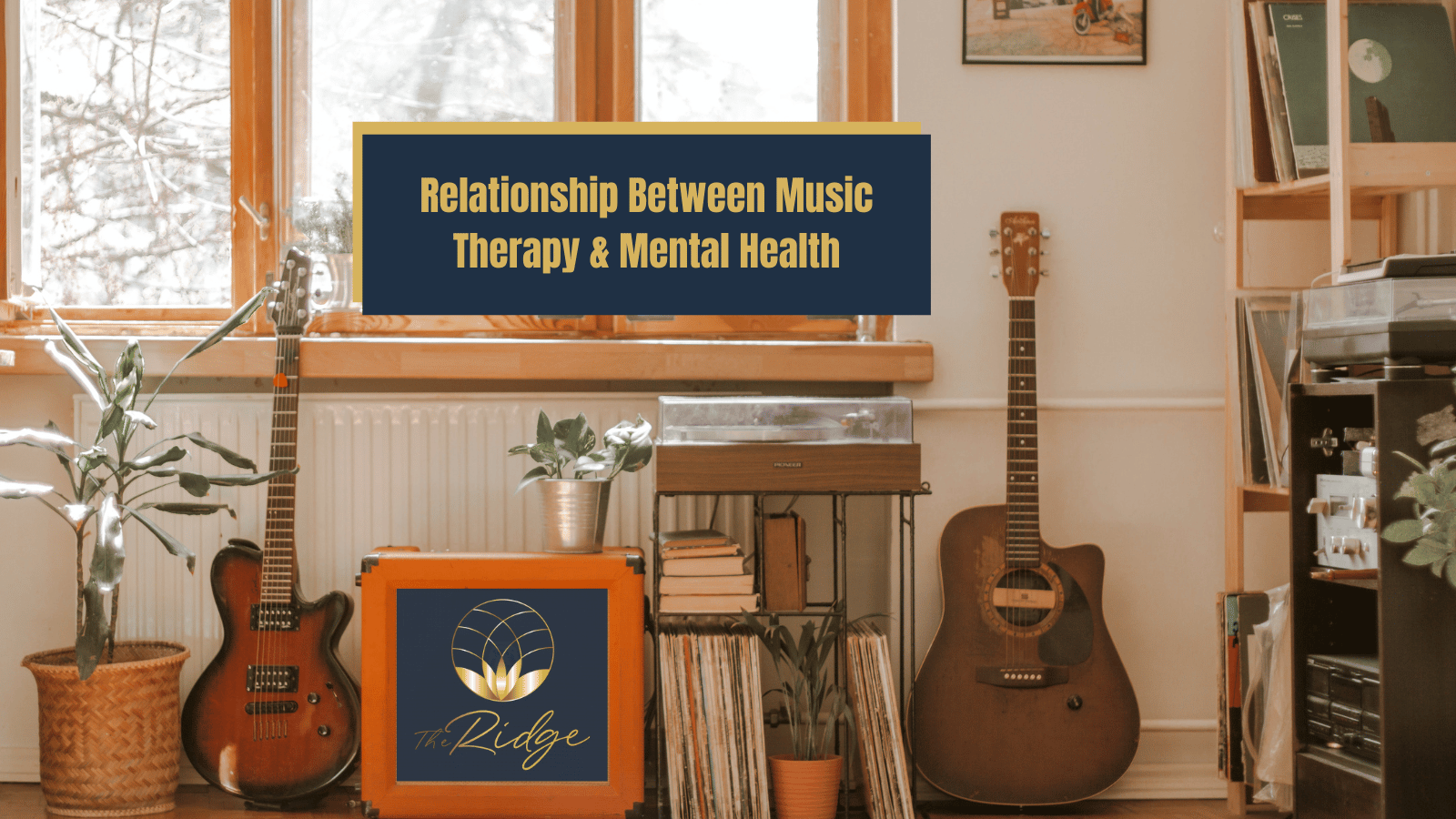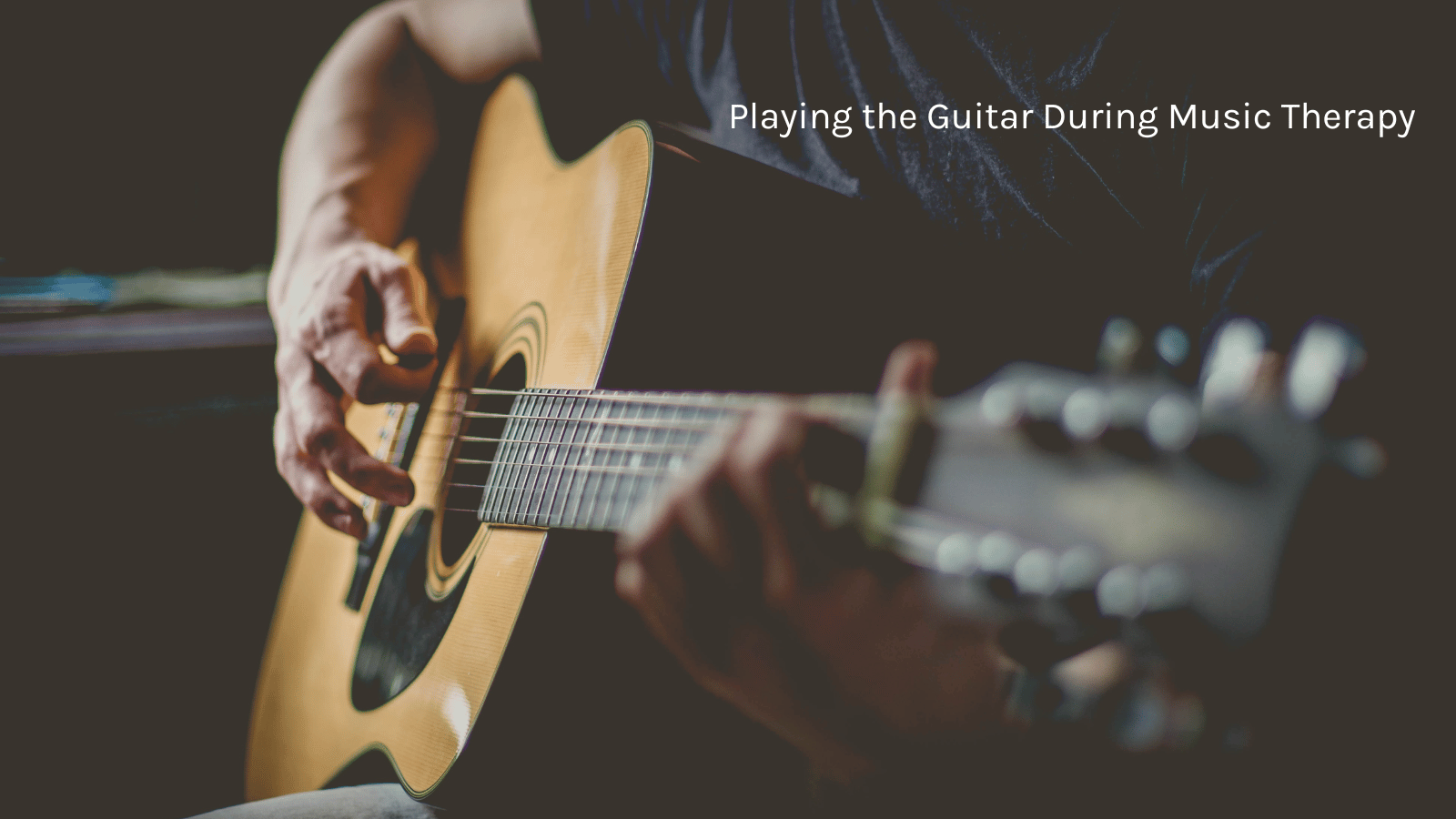- Home
- Blog
- Addiction Treatment
- Relationship Between Music Therapy & Mental Health
Relationship Between Music Therapy & Mental Health

- Home
- Blog
- Addiction Treatment
- Relationship Between Music Therapy & Mental Health

Table of Contents
Music therapy, an established health profession, uses music to address physical, emotional, cognitive, and social needs in individuals. According to the American Music Therapy Association, music therapy interventions can be designed to manage stress, alleviate pain, express feelings, enhance memory, improve communication, and promote physical rehabilitation. A striking statistic from a study by the National Alliance on Mental Illness reveals that music therapy has shown a significant positive effect in treating depression, with over 60% of patients in music therapy reporting substantial improvement in mood and mental health. This underscores the potential of music therapy as a valuable tool in the realm of mental health care.
Music therapy’s relationship with mental health is multifaceted and profound. This article explores this connection in-depth, examining how music therapy works, its applications for various mental health conditions, and the benefits it offers. Whether as a primary treatment modality or a complementary approach, music therapy holds a unique and powerful place in the landscape of mental health treatment.

What is Music Therapy?
Music therapy is a therapeutic approach that uses music to address the physical, emotional, cognitive, and social needs of individuals. It is an established health profession practiced by certified music therapists who are skilled musicians with extensive training in therapy and rehabilitation. Music therapy involves a range of music-making methods, including listening, singing, playing instruments, and composing music, tailored to the individual needs of each client.
The practice of music therapy dates back to ancient times, but it gained formal recognition as a professional therapy method in the 20th century, especially after World Wars I and II, when musicians would play for veterans suffering from war-related emotional and physical trauma. This led to the realization of music’s therapeutic benefits and its formal development into a structured clinical profession.
In music therapy sessions, therapists assess the emotional well-being, physical health, social functioning, communication abilities, and cognitive skills of their clients. Through musical responses, the therapist identifies the client’s strengths and areas needing improvement and uses this information to devise a customized treatment plan. The goal of music therapy is not to teach music skills but to utilize music as a tool to bring about therapeutic change and personal growth.
How Does Music Therapy Work?
Music therapy operates on the principle that music can profoundly affect both the mind and the body. The process is multifaceted, involving the brain’s response to rhythm, melody, and harmony. This response can trigger various psychological and physiological changes, such as releasing endorphins, reducing stress hormones, and altering brainwave patterns, leading to states of relaxation or alertness.
At its core, music therapy works by tapping into the emotional and symbolic aspects of music to facilitate expression and interaction. For instance, music can evoke emotions without the use of words, making it an excellent tool for individuals who struggle with verbal communication. Furthermore, music’s rhythm can influence physiological responses, aiding in the regulation of breathing and heart rate, which is particularly beneficial in conditions like anxiety or PTSD.
The brain’s neuroplasticity, its ability to reorganize and form new neural connections, also plays a crucial role in music therapy. Engaging with music can stimulate areas of the brain associated with memory, emotion, and sensory processing, fostering cognitive and emotional healing. Music therapy’s effectiveness lies in its ability to be both a universal and a highly individualized medium. It transcends language barriers and can be tailored to resonate personally with each individual, regardless of their musical background.
What Mental Health Conditions Can Music Therapy Address?
Music therapy has been effective in treating a wide range of mental health conditions. It is particularly beneficial for:
- Depression: Music therapy can offer an outlet for expression and a source of pleasure, helping to alleviate symptoms of depression. It can also encourage social interaction and engagement, combating isolation.
- Anxiety Disorders: The calming effects of music can help regulate breathing and heart rate, reducing symptoms of anxiety. Music therapy sessions can also provide a safe space for individuals to explore and process their anxieties.
- Post-Traumatic Stress Disorder (PTSD): For individuals with PTSD, music therapy can be a non-threatening medium to express emotions and process traumatic experiences. The rhythmic elements of music can help in grounding and stabilizing mood.
- Schizophrenia and Other Psychotic Disorders: Music therapy can assist in managing symptoms like hallucinations and disorganized thinking. It can also improve social interaction and communication skills.
- Dementia and Alzheimer’s Disease: While primarily neurodegenerative disorders, the emotional and behavioral symptoms of dementia can be alleviated through music therapy. It can stimulate memory recall and provide a sense of comfort and familiarity.
- Autism Spectrum Disorder: Music therapy can enhance communication, improve social skills, and help manage sensory issues in individuals with autism.
The effectiveness of music therapy in these conditions is supported by a growing body of research. Studies have demonstrated significant improvements in mood, reduced anxiety levels, and enhanced cognitive functioning in patients undergoing music therapy. This evidence highlights the potential of music therapy as a valuable complement to traditional mental health treatments.

What Happens in a Music Therapy Session?
A music therapy session is a structured yet flexible therapeutic interaction that varies greatly depending on the individual’s needs and objectives. Typically conducted by a certified music therapist, these sessions can take place in various settings, including hospitals, clinics, schools, or private practices. The activities in a music therapy session can include:
- Listening to Music: The therapist might play or choose music based on the therapeutic goals, such as relaxation, mood elevation, or emotional expression. Listening can evoke memories, emotions, and stimulate cognitive and sensory responses.
- Playing Instruments: Clients are encouraged to play instruments, which can help with motor skills, emotional expression, and social interaction. No prior musical skill is required, and the focus is on therapeutic engagement rather than musical proficiency.
- Singing: Singing can be used to improve mood, enhance memory, and facilitate verbal communication and articulation. It can be particularly effective for individuals with speech impairments or those recovering from a stroke.
- Writing Songs or Composing Music: Creating music allows clients to express themselves creatively and emotionally. It can be particularly empowering, giving voice to feelings or experiences that might be difficult to articulate in words.
- Improvisation: This involves spontaneously creating music and can be a powerful tool for non-verbal communication and expression. It allows the therapist to gain insights into the client’s emotions and thought processes.
- Movement to Music: This can include dancing or other forms of movement, aiding in physical coordination, and emotional release.
Each session is tailored to the client’s needs and goals. The therapist continuously assesses the client’s response and adjusts the session accordingly. The safe and supportive environment of a music therapy session helps clients explore their emotions, cope with stress, and work on specific therapeutic goals.
How Does Music Therapy Complement Other Mental Health Treatments?
Music therapy is often used in conjunction with other mental health treatments, enhancing their effectiveness and providing a holistic approach to care. It complements other therapies in several ways:
- Enhancing Cognitive-Behavioral Therapy (CBT): Music can provide a backdrop for exploring and changing negative thought patterns, a key component of CBT. It can also be used to practice and reinforce coping strategies learned in CBT sessions.
- Supporting Psychotherapy: Music therapy can facilitate emotional expression and introspection, providing valuable material for discussion in psychotherapy sessions. It can help individuals access and process emotions that might be difficult to express through words alone.
- Augmenting Group Therapy: In group settings, music therapy can foster a sense of community, improve social skills, and provide a shared, non-threatening activity for group members to bond over.
- Complementing Medication Regimens: While music therapy does not replace medication, it can enhance the overall well-being of individuals taking medication for mental health conditions. It offers a non-pharmacological tool to manage symptoms like anxiety and depression.
- Integrating with Rehabilitation Programs: For individuals recovering from addiction or other mental health conditions, music therapy can provide a positive, creative outlet, aiding in the rehabilitation process.
By incorporating music therapy into a broader treatment plan, therapists can address various aspects of a client’s well-being. This multi-modal approach can be especially effective, as it caters to the diverse needs and preferences of individuals seeking mental health care.
Can Music Therapy Be Self-Administered?
While professional guidance from a certified music therapist is ideal for addressing specific mental health issues, some aspects of music therapy can be self-administered for general well-being. Individuals can use music as a therapeutic tool in their daily lives by:
- Creating Personalized Playlists: Tailoring music selections to fit different moods or needs, such as relaxation, motivation, or comfort.
- Engaging in Mindful Listening: Actively listening to music and being present in the experience can aid in relaxation and stress reduction.
- Playing an Instrument: Learning to play an instrument can be a therapeutic hobby that fosters a sense of achievement and provides a creative outlet.
- Singing: Singing, whether alone or in a group, can be uplifting and therapeutic, particularly for expressing emotions.
However, it’s important to approach self-administered music therapy with awareness. Certain types of music or lyrics might trigger negative emotions or memories. Therefore, individuals are advised to be mindful of their reactions to different music and adjust their choices accordingly.
What Does Research Say About Music Therapy and Mental Health?
Research in the field of music therapy has consistently demonstrated its effectiveness in improving mental health. Key findings include:
- Reducing Symptoms of Depression and Anxiety: Studies have shown that music therapy can significantly decrease the symptoms of depression and anxiety, often used alongside traditional therapies.
- Improving Symptoms in PTSD Patients: Research indicates that music therapy can reduce the severity of PTSD symptoms, helping individuals process trauma in a safe, controlled environment.
- Enhancing Cognitive Functioning in Dementia Patients: For those with dementia, music therapy has been found to improve memory recall and cognitive functioning, as well as reduce agitation.
- Benefiting Children with Autism: Music therapy has shown positive results in improving social communication and interaction among children with autism spectrum disorder.
These studies underscore the versatility and effectiveness of music therapy across various mental health conditions, supporting its growing recognition as a valuable therapeutic tool.
How to Find a Qualified Music Therapist?
Finding a qualified music therapist involves several steps:
- Check Credentials: Look for therapists certified by reputable organizations like the American Music Therapy Association.
- Research Their Background: Consider their experience, specialization, and approach to ensure they align with your specific needs.
- Ask for Referrals: Healthcare providers, mental health professionals, or educational institutions may provide referrals.
- Consult Reviews or Testimonials: These can give insights into the therapist’s methods and effectiveness from the perspective of their clients.
- Schedule a Consultation: Meeting the therapist beforehand can help determine if their style and personality are a good fit.
Music Therapy Success Stories
Countless individuals have experienced transformative effects through music therapy. For instance, veterans with PTSD have found solace and expression in music therapy, aiding in their emotional recovery. Children with autism have shown remarkable improvements in social skills and communication through music-based interactions. Adults with depression have reported feeling more hopeful and less isolated after participating in music therapy sessions. These success stories illustrate the profound impact music therapy can have on individuals from all walks of life.
Conclusion
Music therapy offers a unique and effective approach to mental health treatment, providing emotional, cognitive, and social benefits. Its flexibility and adaptability make it suitable for a wide range of individuals and conditions. As research continues to affirm its value, music therapy stands as a testament to the healing power of music, transcending traditional treatment methods and offering a holistic path to recovery and well-being.

Exploring Music Therapy Options at The Ridge
For those seeking a comprehensive approach to recovery that includes music therapy, The Ridge, a luxury drug rehab center, presents an ideal option. Located in Cincinnati, Ohio, The Ridge attracts clients from all over the United States, offering a serene and supportive environment conducive to healing. Their Inpatient Drug and Alcohol Rehab In Cincinnati, Ohio integrates music therapy with other treatment modalities, providing a holistic approach to recovery. Whether you’re looking for an innovative way to address mental health challenges or seeking a retreat that combines luxury with therapeutic efficacy, The Ridge is equipped to meet a diverse range of needs. To explore how music therapy at The Ridge can be part of your or a loved one’s journey towards mental wellness, visit their website or contact them directly for more information.





